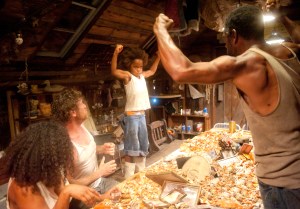
Drifting in from various film festivals on smoke signals of lavish praise, the unique, fascinating and ultimately depressing film called Beasts of the Southern Wild— a low-budget independent film by Benh Zeitlin about survivors of apocalyptic Hurricane Katrina, shot in the back swamps of Terrebonne Parish, La., using local nonactors instead of Hollywood extras—is now ready to engage the movie-going public in the darkness of a dream. There is no guarantee that the movie-going public is ready. I don’t notice any critics offering to pick up its deficit tabs in case it floats away from good reviews. But get ready anyway. Brilliant, compelling and powerful, this offbeat look at a part of a world we live in but know nothing about is not going to disappear without at first making a noise.
In a desolate, burned-out butt end of nowhere (the shrimp-trawling, blackened catfish, Cajun part of Southeastern Louisiana), a little girl they call Hushpuppy is left alone for days and nights on end when her desperately ill father disappears, forcing her to invent her own survival techniques. The setting is the emotionally parched and geographically designed cartographer’s view of hell called The Bathtub—what’s left of an area of makeshift cardboard and toothpick shanties that Katrina devastated, scattering the region’s population to the wind like dandelion fuzz. It lies low between the Gulf and the Mississippi River—a man-made wall has gone up on the dry side of the levee to protect against annihilating floods. This is where nothing grows, catfish and crawdads from polluted water are the only food, and stubborn Cajuns who refused to evacuate to higher ground when Brad Pitt and Sean Penn came down to rescue them on CNN News still live in the ultimate depths of poverty and ignorance. It’s the most sobering view of the uneducated and disenfranchised outcasts the world has forgotten since Precious.
Fueled by homespun philosophy she learned in a one-room schoolhouse that has since washed away, 6-year-old Hushpuppy (played with raw, largely improvised energy by a world-weary child named Quvenzhané Wallis) provides childish narration (“The whole universe depends on everything fittin’ together just right.”) that carries the action between scenes of day-in and day-out living while Hushpuppy and her sick father do whatever they have to in order to avoid being rounded up and sent to a homeless shelter. Nothing fits in Hushpuppy’s dismal, deprived world of a jerry-built trailer safely lodged in a tree just high enough off the ground to keep the gators and cottonmouth water moccasins away. Heating up cat food for dinner, she defiantly blows up the trailer, reducing her only home life to the rear end of an old truck bed, mounted like a barge in the bayou on floating oil drums. When the levee is dynamited to drain the diseased water out, Hushpuppy and her dying father, Wink (Dwight Henry), are at last processed into a holding facility for storm refugees. Equipped with food and medicine, they have a chance for a future at last, but all Daddy can think of is breaking out and wading home through the snake-infested swamps to the condemned mud, ruins and burial grounds of dead animals—the marshy swamp they used to call home. The children end up on a barge that takes them to a floating brothel in the Gulf, their only link to civilization the occasional whir of a helicopter hovering overhead, searching for survivors who don’t want to be rescued. Gnawing on a raw crab leg for nourishment, Hushpuppy is a resourceful and imaginative child, supplementing the harsh, cruel reality around her with occasional visits from mythical carnivorous boars from the Ice Age of Hushpuppy’s nightmares called “auruchs,” who descend on the toothless outcasts of The Bathtub ready to kill them with sharp tusks and eat them alive. The auruchs are pure creations of the kind of computer-generated technology denizens of the Louisiana tide basin have never even heard of, but they add a badly needed intrusion of action in the slow, actionless story of Hushpuppy and her fear of losing her father-protector. They also stand metaphorically as a link between the endangered species of another era and the last living human remnants of today’s lost civilization of the dispossessed. One of the saddest moments in the film comes near the end, when the child’s tear-stained eyes—a mirror to the chaos and terror in the misery around her—and forlorn face, masking resignation, need and the desperation to be taken care of, come together like a grownup, as she confesses to the camera that she cannot remember ever being hugged by another living person.
This is lacerating stuff, not remotely ready to be embraced by a wide audience beyond critics and hardcore movie buffs, but it has haunted me so profoundly that I want to see it again. Filmed with blood and sweat by Benh Zeitlin, and based on a play by his co-writer Lucy Alibar, Beasts of the Southern Wild combines undeniable elements of global warming, of Robert Flaherty’s poetic documentary The Louisiana Story and grass-roots heroism, while telling a harrowing coming-of-age story set in a forgotten time and place the world knows about only from newspapers. Poetry and history come together in a unique, two-fisted kidney punch that lands with the force of a magic wand.
Don’t miss this one. A brave and inspired antidote to time-wasting mainstream movies, it is unlike anything you’ve seen before or will likely ever see again. In short, it is unforgettable.
rreed@observer.com
BEASTS OF THE SOUTHERN WILD
Running Time 91 minutes
Written by Lucy Alibar, Benh Zeitlin
Directed by Benh Zeitlin
Starring Quvenzhané Wallis, Dwight Henry and Levy Easterly
3.5/4

